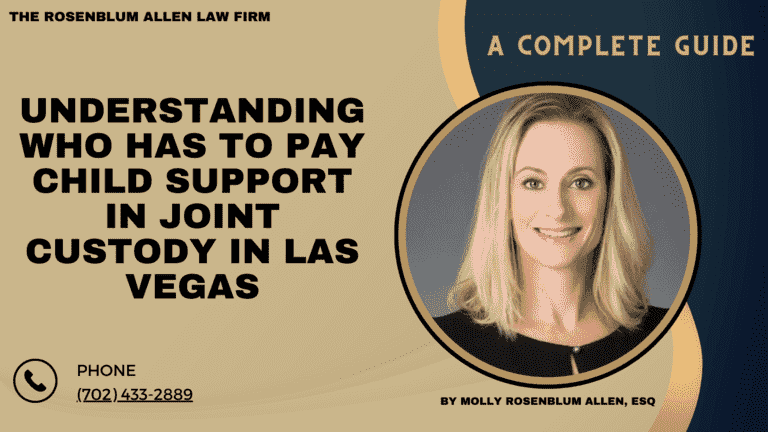Navigating the world of joint custody and child support in Las Vegas can be a complex journey.
It’s filled with legal jargon and intricate procedures. This journey is guided by the well-being of children, the shining stars who guide the decisions made by courts and parents alike.
This article aims to help people understand child support within Las Vegas joint custody. It illuminates the path for those trying to grasp the intricacies.
Whether you’re a first-time parent or seeking clarity on your obligations, we’re here to guide you through the desert of legalities into the oasis of understanding.

 Child Support Laws in Nevada
Child Support Laws in Nevada
In Silver State, we design child support laws with the child’s best interests in mind. These laws establish a framework to ensure that children receive adequate financial support from their parents. The laws apply regardless of the custody arrangement. Here’s a bird’s-eye view of the legal landscape:
Nevada’s Legal Framework for Child Support: At its core, Nevada’s approach to child support aims to balance the financial contributions of both parents based on their ability to pay and the child’s needs.
The Role of the Nevada Child Support Guidelines: These guidelines serve as the compass for determining the amount of child support. They consider various factors. These include the income of both parents, the cost of healthcare, and educational expenses, to name a few.

Understanding Joint Custody in Las Vegas
The term “joint custody” can often bring to mind a complex labyrinth of legal definitions and arrangements. Here’s what you need to know to navigate this part of your journey:
Definition of Joint Custody
Joint custody is a shared arrangement. Parents retain legal rights and responsibilities towards their children. It’s the legal equivalent of both parents sitting in the cockpit, steering their child’s upbringing together.
Types of Joint Custody
Physical Custody: This refers to where the child lives. In a joint physical custody scenario, the child spends significant time living with both parents.
Legal Custody: This aspect focuses on decision-making power regarding the child’s education, health, and welfare. Joint legal custody means both parents have a say in these crucial decisions.
How Joint Custody Affects Child Support Obligations
The intertwining of joint custody and child support is akin to a dance. Various factors determine the steps. They include the time spent with the child and the parent’s income. Joint custody doesn’t erase the need for child support. Instead, it adjusts how it’s calculated and distributed.

Determining Child Support in Joint Custody Cases
Calculating child support in joint custody cases requires a meticulous balancing act. The goal is to ensure both parents contribute fairly to the child’s financial needs.
Factors Influencing Child Support in Joint Custody
The formula for calculating child support in joint custody scenarios takes into account:
Income of Both Parents: This includes wages, bonuses, and other income forms.
Time Spent with the Child by Each Parent: The more time a child spends with a parent, the more that parent’s share of the child support may be adjusted.
Child’s Needs and Expenses: This encompasses everything from basic needs like food and clothing to educational expenses and healthcare.
Calculating Child Support: The Nevada Child Support Formula
The Nevada Child Support Formula is a mathematical equation. It ensures fairness and adequacy in child support arrangements. While the specifics can get complex, here’s a simplified breakdown:
Determine Gross Monthly Income: Start with each parent’s total monthly income.
Adjust for Custody Time: The amount of time the child spends with each parent can affect the calculation.
Apply the Guidelines: The state’s guidelines provide percentages based on the number of children and other factors.
Example Calculations: To give you a clearer picture, let’s say Parent A earns $3,000 monthly, and Parent B earns $2,000. Suppose they have one child and equal custody. In that case, the guidelines might require a certain percentage of their combined income to be allocated for child support. The percentage could be adjusted based on their custody agreement and individual incomes.
This section of our guide is just the beginning. As we delve deeper into the roles and responsibilities in joint custody, the legal process for establishing and modifying child support, and answer some common questions, we’ll continue to provide you with the clarity and understanding you need to navigate this vital aspect of parenting after separation or divorce in Las Vegas. Stay tuned as we explore these topics in further detail.

Roles and Responsibilities in Joint Custody
Joint custody is like a partnership. Both parents contribute to their child’s upbringing, financially and emotionally. This section outlines the shared and individual responsibilities that come with this arrangement.
Financial Responsibilities of Each Parent
Parents must contribute to the child’s financial needs in a joint custody scenario. This includes:
Direct Payments: This refers to the child support one parent pays to the other, as determined by the court.
Indirect Expenses: These are costs that parents may pay directly, such as school fees, medical expenses, or extracurricular activities.
Non-financial Contributions and Their Impact
Besides monetary support, parents’ involvement in their child’s life is crucial. This includes:
Time Spent Together: Quality time contributes to the child’s emotional well-being.
Educational Support: Helping with homework and attending school meetings.
Emotional Guidance: Providing love, support, and advice.
Adjustments and Modifications to Child Support Orders
Life is full of changes, and parents’ financial circumstances can evolve. Here’s how modifications to child support orders are handled:
Circumstances for Modification: Significant changes in income, the needs of the child, or custody arrangements can warrant a review of the child support order.
Legal Procedure for Modification: To modify child support, a parent must file a request with the court, providing evidence of the changed circumstances.

Legal Process for Child Support in Joint Custody
The legal journey to establish, enforce, or modify child support can be intricate. Here’s a roadmap to guide you through the process.
Initiating a Child Support Case in Las Vegas
Required Documentation: Parents must gather financial documents, custody agreements, and other relevant information.
Legal Proceedings Overview: The process typically involves filing a petition, serving the other parent, and attending a court hearing where the judge will decide based on the evidence presented.
Enforcement of Child Support Orders
Ensuring compliance with child support orders is crucial for the child’s welfare. Here’s how enforcement is handled:
Role of the District Attorney’s Office: In cases of non-payment, this office can take actions such as garnishing wages or intercepting tax refunds.
Legal Consequences for Non-Payment: Fines, license suspensions, or jail time.
Modifying Child Support Orders
Circumstances for Modification: Significant changes in a parent’s income or the child’s needs may justify a modification.
Legal Procedure for Modification: This involves filing a motion, providing evidence of the changes, and possibly attending a hearing.

Common Questions About Child Support in Joint Custody
Let’s address frequently asked questions to clarify common misconceptions and concerns.
Does joint custody eliminate the need for child support?: No, child support may still be required to meet the child’s needs, regardless of the custody arrangement.
How is child support split in 50/50 custody arrangements?: The court considers parents’ incomes and the child’s needs to determine child support, even in 50/50 custody cases.
What happens if a parent’s financial situation changes?: Parents can request a modification of the child support order to reflect significant financial changes.

Resources for Parents
Navigating child support and custody can be overwhelming. Fortunately, there are resources available to help:
Legal Assistance and Representation: Legal aid organizations and family law attorneys can provide guidance and representation.
Support Services for Managing Child Support Payments: The Nevada Division of Welfare and Supportive Services offers tools for tracking and managing child support payments.
Educational Resources: Workshops, online resources, and counseling services can offer support and information on navigating the challenges of co-parenting and child support.

Breaking It All Down
Understanding who has to pay child support in joint custody in Las Vegas involves:
Navigating a complex legal landscape.
Considering the financial and emotional well-being of the children involved.
Adapting to life’s inevitable changes.
By embracing their responsibilities and available resources, parents can ensure their children receive the support they need to thrive. Remember, you don’t have to travel the child support and custody journey alone. Legal professionals, support services, and educational resources are ready to guide you at every step.

More Frequently Asked Questions
Does joint custody eliminate the need for child support?
No, child support may still be required to meet the child’s needs, regardless of the custody arrangement.
How is child support split in 50/50 custody arrangements?
The court considers parents’ incomes and the child’s needs to determine child support, even in 50/50 custody cases.
What happens if a parent’s financial situation changes?
Parents can request a modification of the child support order to reflect significant financial changes.
Can a parent refuse to pay child support if they are not granted visitation rights?
The legal system treats child support and visitation rights as separate issues. A parent cannot refuse to pay child support due to a lack of visitation rights. Seek legal help to address the custody arrangement if visitation issues arise. Do not withhold child support.
How does the court determine what is in the child’s best interest?
The court considers several factors when determining the best interest of the child. These factors include the child’s age, health, emotional ties to each parent, the ability of each parent to provide for the child’s needs, and any history of family violence or substance abuse. The court’s primary goal is to ensure the child’s health, safety, and welfare.
Are both parents required to provide health insurance for the child?
The court may order one or both parents to provide health insurance for the child as part of the child support order. The decision depends on the availability and cost of health insurance through the parents’ employers or other sources.
What happens if a parent moves out of state?
If a parent moves out of state, the child support order remains in effect. Interstate child support enforcement laws, such as the Uniform Interstate Family Support Act (UIFSA), ensure that child support orders are recognized and enforced across state lines.
Can parents use child support to cover educational expenses?
Child support can cover many expenses, including necessities, medical care, and educational expenses. The child support order or agreement between the parents may specify how the child support funds should be used.
How do changes in custody arrangements affect child support?
Changes in custody arrangements can significantly affect child support obligations. If the custody arrangement changes significantly, either parent can ask to review and modify the child support order to match the new custody situation.
What if a parent becomes unemployed or has a low income?
The court considers a parent’s actual earning capacity, not just their current income. If a parent is unemployed or underemployed by choice, the court may impute income based on factors like work history, education, and the local job market. However, adjustments may be made for parents who cannot pay due to circumstances beyond their control.
Is it possible to make informal child support arrangements without going to court?
Parents can make informal arrangements. However, it’s advisable to have any child support agreement approved by the court. This ensures enforceability and provides a clear legal framework for both parents to follow, protecting the rights and interests of the child and both parents.
How long does a parent have to pay child support?
Child support must be paid until the child reaches the age of majority, which in Nevada is 18 or until they complete high school, not exceeding 19 unless specified by the court. This applies to children with special needs or in certain circumstances.
Can the court require grandparents to pay child support?
Generally, grandparents are not legally obligated to pay child support. Child support is the responsibility of the child’s biological or adoptive parents. However, in rare cases where grandparents have legal guardianship, they may have financial obligations toward the child.

Glossary
Child Support: Financial contributions required from parents to support their child’s living expenses and well-being after separation or divorce.
Joint Custody: A legal arrangement where both parents share the rights and responsibilities for their child’s upbringing, including physical and legal custody.
Physical Custody: Refers to with whom the child lives. In joint physical custody, the child spends significant time living with both parents.
Legal Custody: The right to make important decisions about a child’s life, including education, health care, and religious upbringing. Joint legal custody allows both parents to have equal decision-making power.
Nevada Child Support Guidelines: A set of rules and calculations used to determine the amount of child support one parent must pay the other based on income, custody arrangements, and the child’s needs.
Income Imputation: The process of assigning a potential income level to a parent based on their work history, qualifications, and the current job market, used when a parent is unemployed or underemployed by choice.
Modification of Child Support: A legal process to change the amount of child support paid due to changes in the parent’s financial situation, the needs of the child, or the custody arrangement.
Enforcement of Child Support Orders: Actions taken by the court or a designated agency to ensure that child support payments are made according to a child support order.
Uniform Interstate Family Support Act (UIFSA): Federal legislation that facilitates enforcing child support orders across state lines.
Best Interest of the Child: A legal standard that guides courts in making decisions about custody and visitation, focusing on the child’s health, safety, and welfare.
Health Insurance for the Child: A requirement that may be included in a child support order, specifying that one or both parents must provide health insurance coverage for the child.
Educational Expenses: Costs associated with a child’s education, such as tuition, books, and supplies, which child support payments can cover.
Earning Capacity: The amount of money an individual can earn based on their skills, work history, education, and the availability of jobs in the market.
Informal Child Support Arrangements: Agreements made between parents outside of court regarding child support payments are not legally binding unless approved by a court.
Age of Majority: The legal age at which a child is considered an adult and no longer eligible for child support, which is 18 in Nevada, unless specific conditions extend the obligation.

Additional Resources for You
Molly Rosenblum, Esq., our lead attorney, has dedicated significant effort to creating a suite of resources focused on addressing common and complex questions surrounding child support. These resources, meticulously compiled and made available through the Rosenblum Law website, aim to provide clarity, legal insight, and guidance for those navigating the intricacies of child support laws and procedures. Whether you’re seeking to understand how changes in your life impact child support obligations, or you’re looking for specific advice on child support matters in Las Vegas, these resources are designed to assist you. Here’s a brief overview of the resources available:
Child Support Modification: Guidance on how to modify child support payments, including the circumstances under which modifications may be considered and the process for making such changes. Learn about modifying child support.
Does My New Spouse’s Income Count for Child Support: Insight into how a new marriage and the new spouse’s income can affect child support calculations and obligations. Understand the impact of new spousal income.
How to Get Child Support Arrears Dismissed: Advice on dealing with child support arrears, including potential strategies for having these arrears dismissed or reduced. Explore options for addressing arrears.
Las Vegas Child Support: Specific information regarding child support in Las Vegas, including how payments are calculated, enforced, and modified. Learn about Las Vegas child support.
Las Vegas Child Support Laws: A comprehensive overview of child support laws specific to Las Vegas, offering vital information for parents navigating the support process in this jurisdiction. Discover Las Vegas child support laws.
Through these resources, Molly Rosenblum, Esq., aims to empower individuals with the knowledge and tools necessary to effectively manage their child support concerns. We encourage you to take advantage of these resources, designed to help you navigate the complexities of child support law with confidence and clarity.

Outside Resources for You
Nevada Judiciary: The official website for the Nevada court system, offering resources and information on family law, including child support and custody. Visit Nevada Judiciary
Clark County Family Law Self-Help Center: Provides self-help legal information for Clark County residents, including forms and guidance on child support and custody issues. Visit Clark County Family Law Self-Help Center
State Bar of Nevada: Offers resources for finding attorneys in Nevada, including those specializing in family law, and provides legal information related to child support and custody. Visit State Bar of Nevada
Nevada Division of Welfare and Supportive Services (DWSS): The state agency responsible for administering child support services, including establishing, enforcing, and modifying child support orders. Visit Nevada Division of Welfare and Supportive Services
American Bar Association (ABA) – Family Law Section: Provides resources and information on family law topics, including child support and custody, beneficial for individuals seeking a broader understanding of legal issues. Visit American Bar Association – Family Law Section
National Center for State Courts (NCSC): Offers resources and information on family law matters, including child support and custody, across all states, useful for understanding how Nevada fits into the wider national context. Visit National Center for State Courts
Legal Aid Center of Southern Nevada: A nonprofit organization providing free legal assistance to low-income residents of Southern Nevada, including matters related to family law, child support, and custody. Visit Legal Aid Center of Southern Nevada

A Special Message from Our Lead Attorney, Molly Rosenblum Allen, Esq

Dear Reader,
Thank you so much for taking the time to explore our resources on child support and custody matters. We hope you found the information insightful and helpful. It can help you understand the legal landscape surrounding these crucial family law issues.
At The Rosenblum Allen Law Firm, we guide our clients through the complexities of family law. We do this with empathy, expertise, and unwavering support. If you’re navigating child support or custody challenges, or have any questions about your specific situation, we’re here to help.
Please don’t hesitate to reach out and call us at (702) 433-2889. Molly and our team are ready to listen and work alongside you to address your needs. We’ll take the following steps to resolve your situation.
Warm regards,
Molly and The Rosenblum Allen Law Firm Team



